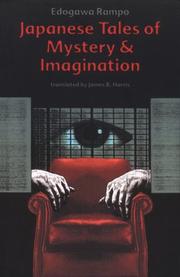| Listing 1 - 10 of 11 | << page >> |
Sort by
|
Book
ISBN: 2716901716 9782716901710 Year: 1983 Publisher: Paris Publications orientalistes de France
Abstract | Keywords | Export | Availability | Bookmark
 Loading...
Loading...Choose an application
- Reference Manager
- EndNote
- RefWorks (Direct export to RefWorks)
Book
ISBN: 9780691189659 069118965X Year: 2019 Publisher: Princeton, NJ
Abstract | Keywords | Export | Availability | Bookmark
 Loading...
Loading...Choose an application
- Reference Manager
- EndNote
- RefWorks (Direct export to RefWorks)
A collection of twenty-eight weird and wonderful stories by the writer Lafcadio Hearn (1850-1904), inspired by Japanese folk tales and introduced by Andrei CodrescuA collection of twenty-eight brilliant and strange stories, inspired by Japanese folk tales and written by renowned Western expatriate Lafcadio Hearn. Lafcadio Hearn (1850–1904) was one of the nineteenth century’s best-known writers, his name celebrated alongside those of Mark Twain and Robert Louis Stevenson. Born in Greece and raised in Ireland, Hearn was a true prodigy and world traveler. He worked as a reporter in Cincinnati, New Orleans, and the West Indies before heading to Japan in 1890 on a commission from Harper’s. There, he married a Japanese woman from a samurai family, changed his name to Koizumi Yakumo, and became a Japanese subject. An avid collector of traditional Japanese tales, legends, and myths, Hearn taught literature and wrote his own tales for both Japanese and Western audiences. Japanese Tales of Lafcadio Hearn brings together twenty-eight of Hearn’s strangest and most entertaining stories in one elegant volume. Hearn’s tales span a variety of genres. Many are fantastical ghost stories, such as “The Corpse-Rider,” in which a man foils the attempts of his former wife’s ghost to haunt him. Some are love stories in which the beloved is not what she appears to be: in “The Story of Aoyagi,” a young samurai narrowly escapes the wrath of his lord for marrying without permission, only to discover that his wife is the spirit of a willow tree. Throughout this collection, Hearn’s reverence for Japan shines through, and his stories provide insights into the country’s artistic and cultural heritage.

ISBN: 0804803196 4805311932 1462900615 Year: 1971 Publisher: Tokyo Tuttle
Abstract | Keywords | Export | Availability | Bookmark
 Loading...
Loading...Choose an application
- Reference Manager
- EndNote
- RefWorks (Direct export to RefWorks)
Book
ISBN: 9780231184472 0231184476 9780231184465 0231184468 9780231545501 0231545509 Year: 2018 Publisher: La Vergne Columbia University Press
Abstract | Keywords | Export | Availability | Bookmark
 Loading...
Loading...Choose an application
- Reference Manager
- EndNote
- RefWorks (Direct export to RefWorks)
Monsters, Animals, and Other Worlds is a collection of twenty-five medieval Japanese tales of border crossings and the fantastic, featuring demons, samurai, talking animals, amorous plants, and journeys to supernatural realms. With images from the original scroll paintings, it illuminates a rich world of literary, Buddhist, and visual culture.
Otogi-zōshi. --- Japanese fiction --- Japanese prose literature --- Otogi-zZoshi. --- Otogi-zoshi --- J5620 --- J5924 --- Japan: Literature -- folk tales, fairy tales, mukashibanashi, ghost stories --- Japan: Literature -- premodern fiction and prose -- Kamakura and Chūsei in general (1185-1600) --- E-books
Book
ISBN: 0674576357 Year: 1973 Publisher: Cambridge Harvard university
Abstract | Keywords | Export | Availability | Bookmark
 Loading...
Loading...Choose an application
- Reference Manager
- EndNote
- RefWorks (Direct export to RefWorks)
J1872 --- J1890 --- J5610 --- J5620 --- S35/1022 --- Legends, Buddhist --- #SML: Joseph Spae --- Legends --- Japan: Religion -- Buddhism -- Hossō, Yuishiki --- Japan: Religion -- Buddhism -- literature --- Japan: Literature -- story telling, oral literature --- Japan: Literature -- folk tales, fairy tales, mukashibanashi, ghost stories --- Japan--Buddhism: sacred texts (incl. commentaries) see also 37/ --- Buddhist legends. --- Buddhist legends
Book
ISBN: 9784916055804 4916055802 Year: 2017 Publisher: Tokyo Japan publishing industry foundation for culture
Abstract | Keywords | Export | Availability | Bookmark
 Loading...
Loading...Choose an application
- Reference Manager
- EndNote
- RefWorks (Direct export to RefWorks)
"Since ancient times, the Japanese have lived with superstitions of strange presences and phenomena known as "yōkai," creating a culture by turns infused with unease, fear, and divinity. Tsukimono spirit possessions. Fearsome kappa, oni, and tengu. Yamauba crones. Ghostly yūrei. Otherworldly ijin ... Where did they come from? Why do they remain so popular? Written by Japan's premier scholar of yōkai and strange tales, this book is both an introduction to the rich imagination and spirituality of Japan's yōkai culture and a history of the authors and writings that have shaped yōkai studies as a field"--Back cover.
J1723.80 --- J5620 --- Japan: Religion in general -- demonology --- Japan: Literature -- folk tales, fairy tales, mukashibanashi, ghost stories --- Yōkai (Japanese folklore). --- Animals, Mythical --- Demonology --- Ghosts --- Monsters --- Folklore --- Ungeheuer. --- Dämon. --- Geister. --- Fee. --- Monstres --- Esprits. --- Démonologie. --- Bestiaires (genre littéraire) --- Créatures fabuleuses. --- Mythologie japonaise. --- Fantastique. --- Japan.
Book
ISBN: 9022833461 Year: 1979 Publisher: Haarlem Fibula-Van Dishoeck
Abstract | Keywords | Export | Availability | Bookmark
 Loading...
Loading...Choose an application
- Reference Manager
- EndNote
- RefWorks (Direct export to RefWorks)
Folklore --- Japanese language --- Asian literature --- Aziatische letterkunde. --- Bloemlezing. --- J5620 --- J1947 --- J1890 --- Japan: Literature -- folk tales, fairy tales, mukashibanashi, ghost stories --- Japan: Religion -- Shintō -- sacred writings, teachings --- Japan: Religion -- Buddhism -- literature --- J1912.10 --- Japan: Religion -- Shintō -- sacred writings, teachings -- histories, mythologies --- Japan

ISBN: 2226021205 9782226021205 Year: 1984 Volume: 45 Publisher: Paris Albin Michel
Abstract | Keywords | Export | Availability | Bookmark
 Loading...
Loading...Choose an application
- Reference Manager
- EndNote
- RefWorks (Direct export to RefWorks)
Arts martiaux --- S18/0350 --- S16/0250 --- J5620 --- J4202.10 --- China: Music and sports--Wushu, martial arts --- China: Literature and theatrical art--Popular poetry, folksongs, storytelling --- Japan: Literature -- folk tales, fairy tales, mukashibanashi, ghost stories --- Japan: Sociology and anthropology -- communities -- social classes and groups -- samurai, bushi
Book
ISBN: 9780520271029 9780520271012 9780520959125 0520271017 0520271025 0520959124 Year: 2015 Publisher: Oakland, California
Abstract | Keywords | Export | Availability | Bookmark
 Loading...
Loading...Choose an application
- Reference Manager
- EndNote
- RefWorks (Direct export to RefWorks)
Monsters, ghosts, fantastic beings, and supernatural phenomena of all sorts haunt the folklore and popular culture of Japan. Broadly labeled 'yokai, ' these creatures come in infinite shapes and sizes, from tengu mountain goblins and kappa water spirits to shape-shifting foxes and long-tongued ceiling-lickers. Currently popular in anime, manga, film, and computer games, many yokai originated in local legends, folktales, and regional ghost stories. Drawing on years of research in Japan, Michael Dylan Foster unpacks the history and cultural context of yokai, tracing their roots, interpreting their meanings, and introducing people who have hunted them through the ages. In this delightful and accessible narrative, readers will explore the roles played by these mysterious beings within Japanese culture and will also learn of their abundance and variety through detailed entries, some with original illustrations, on more than fifty individual creatures. The Book of Yokai provides a lively excursion into Japanese folklore and its ever-expanding influence within global popular culture. It invites readers to examine how people create, transmit, and collect folklore, and how they make sense of the mysteries in the world around them. By exploring yokai as a concept, we can better understand broader processes of tradition, innovation, storytelling, and individual and communal creativity"--Provided by publisher
Yōkai (Japanese folklore) --- J1723.80 --- J5620 --- Japan: Religion in general -- demonology --- Japan: Literature -- folk tales, fairy tales, mukashibanashi, ghost stories --- Folklore --- Monsters --- Yōkai (Japanese folklore). --- SOCIAL SCIENCE --- Ungeheuer. --- Dämon. --- Volksglaube. --- Yōkai. --- Mythologie japonaise. --- Folktro. --- Folklore & Mythology. --- Japan. --- Japon. --- ancient folktales. --- anime. --- anthropology. --- asian mythology. --- concept of yokai. --- cultural reference. --- film. --- historical context. --- japanese folklore. --- japanese history. --- kappa water spirit. --- kitsune. --- long tongued ceiling licker. --- manga. --- monster guide. --- mountain goblins. --- shape-shifting foxes. --- yokai.
Book
ISBN: 9781433126918 Year: 2015 Publisher: New York Peter Lang
Abstract | Keywords | Export | Availability | Bookmark
 Loading...
Loading...Choose an application
- Reference Manager
- EndNote
- RefWorks (Direct export to RefWorks)
A familiar, beloved, and yet misunderstood character in the Japanese folktale tradition is the animal-woman, an earthly animal that assumes the form of a female human. In order to articulate the characteristics that make Japanese Animal-Wife tales unique, this trailblazing book Japanese Animal-Wife Tales: Narrating Gender Reality in Japanese Folktale Tradition challenges long-held characterizations of them in folklore scholarship. By re-examining the gender-specific behaviors of both the animal-woman and her human spouse, the book recovers the sociocultural and historical contexts that underlay their behaviors to demonstrate the actual gender characteristics that shaped the original Japanese Animal-Wife tales, highlighting the assertive, rather than naïve, personality of women in early Japanese folktale tradition. This new approach to the study of Japanese folktales and culture will interest researchers and students in a variety of fields, including Japanese studies, comparative folklore studies, culture studies, Asian studies, and anthropology. --Provided by publisher.
Relations homme-animal --- Folklore --- Contes --- Études sur le genre --- Anthropologie --- Human-animal relationships --- Man-woman relationships --- Japan --- Nihon --- Nippon --- Iapōnia --- Zhāpān --- I︠A︡ponii︠a︡ --- Yapan --- Japon --- Japão --- Japam --- Mư̄ang Yīpun --- Prathēt Yīpun --- Yīpun --- Jih-pen --- Riben --- Government of Japan --- 日本 --- 日本国 --- Nipponkoku --- Nippon-koku --- Nihonkoku --- Nihon-koku --- State of Japan --- Япония --- Japani --- اليابان --- al-Yābān --- يابان --- Yābān --- Japonsko --- Giappone --- Japonia --- Japonya --- Folklore. --- Female-male relationships --- Male-female relationships --- Men --- Men-women relationships --- Relationships, Man-woman --- Woman-man relationships --- Women --- Women-men relationships --- Interpersonal relations --- Mate selection --- Animal-human relationships --- Animal-man relationships --- Animals and humans --- Human beings and animals --- Man-animal relationships --- Relationships, Human-animal --- Animals --- Relations with women --- Relations with men --- J5620 --- J4176 --- Japan: Literature -- folk tales, fairy tales, mukashibanashi, ghost stories --- Japan: Sociology and anthropology -- gender roles, women, feminism --- Jepun --- Yapon --- Yapon Ulus --- I︠A︡pon --- Япон --- I︠A︡pon Uls --- Япон Улс
| Listing 1 - 10 of 11 | << page >> |
Sort by
|

 Search
Search Feedback
Feedback About UniCat
About UniCat  Help
Help News
News